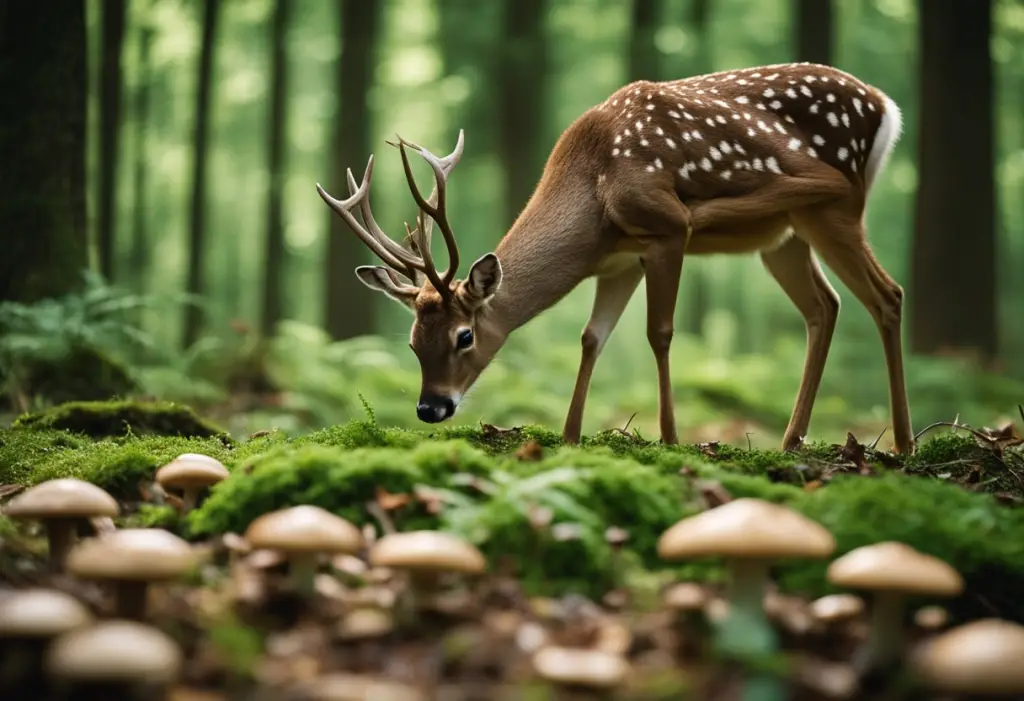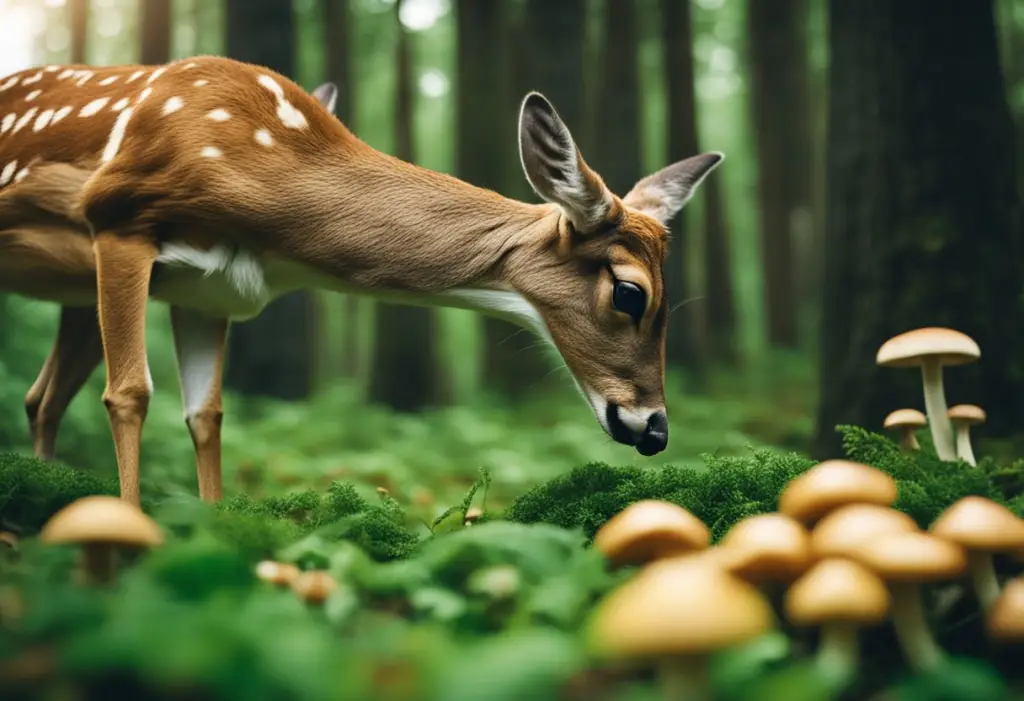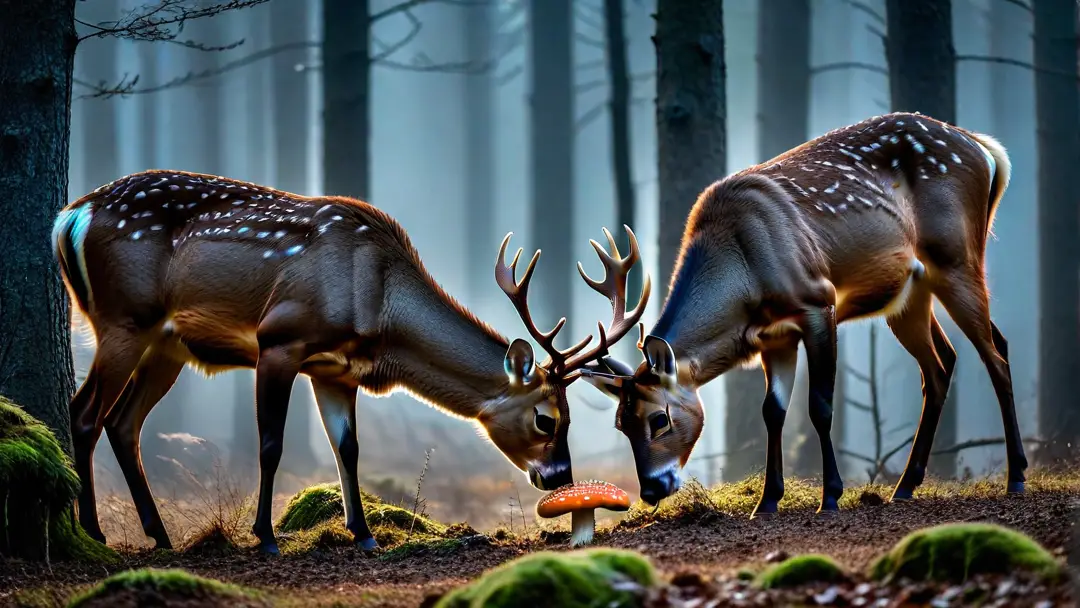Deer are majestic creatures that forage for food in various environments. Wildlife enthusiasts are often curious about their diet. So, do deer eat mushrooms as part of their natural feeding habits?
Yes, deer eat mushrooms. Wild mushrooms are on woodland floors where the animals dwell. These fungi are an added source of nutrition to the vegetation they usually eat.

These magnificent creatures eat plants, including leaves, fruits, nuts, and grasses. Their diet is not restricted to these foods only. Deer will eat mushrooms in the wild. Mushrooms have protein and vitamin that are not easy to find.
They have digestive systems that allow them to eat common mushrooms. They can even eat mushrooms that are mildly toxic to other animals. Mushrooms contribute to a diverse diet, but they are not the most common food that deer eat. This is because of the seasonal availability of these fungi.
Key Takeaways
- Deer enjoy mushrooms. Eating mushrooms is a part of their diverse diet.
- Mushrooms provide deer with essential nutrients not found in their typical plant-based diet.
- Mushrooms are not a primary source of food for deer due to their varying availability.
Table of Contents
Deer Dietary Habits
Deer have a diverse palate and varied diet. Seasonality affects the availability of most mushrooms. Deer eat mushrooms only when available.
Natural Forage Preferences
Deer prefer plant-based foods, which includes an array of foliage, shrubs, and forbs. Their diet is rich in nutrients, minerals, and vitamins, from their natural habitats.
They are particularly adaptive feeders, often choosing vegetation with higher nutritional value. Their behavior can include eating mushrooms, but not all mushrooms. These fungi can be a source of protein and essential vitamins.
Deer will eat different types of mushrooms when they are available.
Deer are Herbivores
Deer maintain a plant-based diet. They will find a forested area rich in leaves, soft shoots, or fruits from trees and shrubs. They also eat grasses and other ground-level plants. These foods provide the essential nutrition needed for their survival.
They get necessary hydration from the plants they consume. Having a water source is also important for their health.
Role of Seasonality in Diet
Seasonality influences the deer diet. Different seasons make different types of food available. Deer will shift their dietary preferences as needed. In spring and summer, deer eat foliage, forbs, and mushrooms. Which are abundant and provide a high nutritional value.
In autmn and winter, they rely more on twigs and branches other foods become scarce. The food available in different seasons gives the deer more variety in their diets.
Understanding Deer Nutrition
Deer need a balanced diet that supports their health and growth. This diet includes a variety of nutrients essential for their well-being.
Nutrient Requirements for Deer Health
Deer health depends on a diet rich in nutrients. These nutrients provide the energy necessary for daily activities and physiological functions. The primary components of a deer’s diet are:
- Carbohydrates: For energy.
- Proteins: Crucial for growth and repair.
- Fats: For energy storage and insulation.
- Vitamins and Minerals: For biochemical reactions and as components of body tissues.
Importance of Protein for Growth
Protein is important to help repair tissue in deer. This is true for growing fawns and adults. Protein comes from various sources including:
- Forbs
- Leaves
- Mushrooms: Known to supply protein and vitamin D.
Deer grow better when they have access to quality protein.
Vitamins and Minerals in Deer Diet
Deer also need various vitamins and minerals for health. Key vitamins and minerals include:
- Calcium and Phosphorus: For bone growth and maintenance.
- Iron: Essential for blood.
- Potassium and Sodium: For nerve function and fluid balance.
- Zinc, Copper, and Selenium: For the immune system and other functions.
- Vitamin C and B Vitamins: For immune health and energy production.
- Vitamin D and Choline: Necessary for various metabolic functions.
These nutrients contribute to a strong immune system and support physiological processes.
Mushrooms in a Deer’s Diet
Deer eat a variety of foods, including mushrooms as a source of nutrition. This section explores their relationship with various fungi. Let’s find out if deer eat mushrooms.
Do Deer Eat Mushrooms?
Deer eat mushrooms and do so depending on the availability and palatability of the fungi. Mushrooms provide a food that complements their diet.
Preferred Types of Mushrooms
Deer eat different types of mushrooms including morels, puffball, and bolete mushrooms. These edible mushrooms provide a safe food option for deer. They avoid poisonous mushrooms, as consumption can be harmful to their health.
The animals will eat different mushroom species. Their favorite mushroom varieties are white mushrooms, oyster mushrooms, portobello mushrooms, table mushrooms. They will eat other non toxic mushrooms. These mushrooms taste good and are easy to digest.
Nutritional Contribution of Mushrooms
While not the staple of a deer’s diet, mushrooms can offer protein content and other nutrients. Oyster mushrooms and shiitake mushrooms have protein and that is beneficial.
Availability and Selection of Mushrooms
Mushroom species like the morel mushroom and puffball mushrooms appear during specific seasons.
Deer select mushrooms that are easy to identify. They avoid poisonous fungi like agaricus bisporus species which might resemble edible ones. They can usually tell the difference between edible and poisonous varieties. These poisonous mushrooms can result in sickness and even death.
These graceful creatures make the most of the food available, including mushrooms.
Deer Habitats and Feeding Behavior
Deer nurtition changes based on their habitat. They live in different conditions from forests to grasslands. Avilability of food and the environment conditions impact their diet.
Habitat Influence on Diet
Habitats rich in trees and woodlands provide deer with a diverse menu. This includes leaves, twigs, fruits, and mushrooms. Water sources and wetlands are also critical in supporting this varied diet.
In grasslands and meadows they eat more grasses and plants. Mushrooms are a smaller part of their diet. Humidity in these areas control growth of mushrooms that deer can eat.
Foraging Patterns and Diet Diversification
Deer seek out nutrient rich foods that are growing in their environment. Mushrooms are one of these foods. Deer will eat different plants and fungi depending on the season. The ecosystem controls what food sources are available.
Risks of Mushroom Consumption
There is a risk when deer actively seek mushrooms. They face similar risks to humans. This includes toxic varieties that can be harmful or even fatal. This section looks at toxic mushrooms and deer.
Toxicity and Deer
Compounds such as alpha-amanitin found in some species can cause severe liver damage. Deer have a strong sense of smell, but they can still mistake some toxic mushrooms. These include waxy cap or certain boletes.
Cases where deer have eaten poisonous mushrooms have lead to death. Not all toxic mushrooms are toxic to humans and vice versa. This is one reason that feeding mushrooms to deer is not a good idea.
Do Deer Eat Poisonous Mushrooms?
Deer usually avoid poisonous varieties. They may generally avoid certain toxic varieties instinctively. These are deer resistant mushrooms.
Same mushrooms like chanterelles, can look the same as poisonous mushrooms. The physical appears can confuse deer and humans.
Deer don’t have reasoning like humans, so they rely on senses. They also use past experience to find edible mushrooms. This helps keep them from consuming toxic mushrooms.
Species-Specific Dietary Preferences
Diets are not always the same in different species of deer. Different species evolved to eat different food. This includes different mushrooms.
Variations Among Deer Species
- Moose: Moose have a diet that consists of higher-fiber content plants such as twigs and bark in the winter. They also consume mushrooms. Like they other warm climate species of mushrooms.
- Elk: Elk diets include grasses, forbs, and shrubs, depending on the season. Mushroom consumption is part of their diet. They are a source of protein and nutrients, especially when other food sources are scarce.
- Mule Deer: Mule deer show a preference for woody plants and brush, but do not shy away from fungi. Eating mushrooms helps this species survive.
- White-Tailed Deer: They eat a combination of leaves, twigs, fruits, and nuts. White-tailed deer will eat most mushrooms that they find.
This shows how different types of deer have adapted to their environment. Food sources include specific mushroom species, like warm climate species with nutritional benefits.
Human Implications and Considerations

The relationship between deer, mushrooms, and humans complex. It invloves ecological impacts and wildlife management considerations.
Impact of Deer Foraging on Local Flora
Deer play a significant role in shaping the plant communities within their habitats. Their habits can lead to both beneficial and detrimental effects. The area where deer live can influence which mushrooms grow. When deer consume mushrooms, they help to spread the mushroom species to new areas.
Over eating can damage the ecosystem. It can reduce the availability of mushrooms and hurt the well being of deer. This can harm other species that rely on mushrooms for nutritional benefits.
Deer Feeding Practices
When humans feed deer, it can have unintended consequences. Deer mushrooms are in the wild. Feeding deer can alter their natural foraging patterns and diet.
If deer rely on humans for food, then they reduce their natural eating patterns. This includes mushrooms. Feeding deer can also damange plants in nearby areas due to deer visiting these areas more often.
Fungi Eating in Wildlife
Mycophagy is consumption of fungi by animals. It’s an overlooked aspect of wildlife ecology. It plays a significant role in the diets deer and affects forest ecosystems. We’ve established that the answer to the question “do deer eat mushrooms” is “yes”.
Deer Among Mycophages
White-tailed deer exhibit mycophagic behavior, incorporating mushrooms into their diet. Mushrooms are a good food food source for deer. They provide essential nutrients like proteins and vitamins.
Deer digestive systems have evolved over the years. They can even process certain toxins found in mushrooms. Deer eat huge range of mushrooms. They also dispers fungus within their habitat.
Mushrooms contribute to the hydration and nutritional needs of deer. This is because mushrooms have a high water content.
Frequently Asked Questions
The diet of deer is an intriguing aspect of their ecology. The type of mushroom that they consume may be different than humans. The mushroom types that deer eat change with each season.
Do deer eat mushrooms?
Yes, deer will eat mushrooms and many mushroom varieties, but they do not make up a majority of their diet.
Do deer eat morel mushrooms?
Yes, deer eat morel mushrooms. Wild morel mushrooms are popular in humans because of their taste and texture. Deer love morel mushrooms like us.
Do deer eat button mushrooms?
Yes, deer will eat this mushroom species. They will eat button mushrooms, also known as white mushrooms. Deer will eat white mushrooms if they can find them.
Which seasons do deer feed on mushrooms?
Deer forage for mushrooms during the late summer and fall. There more mushroom growth during this time.
Are there specific types of mushrooms favored by deer?
Deer are not very selective when choosing mushrooms. They will consume different mushroom varieties. This includes white mushrooms, morel mushrooms, and other fungal delicacies
Do elk eat mushrooms like deer?
Deer and elk have similar living conditions. This leads to overlapping diets. Both deer and elk will have mushrooms when they can.
Which other wildlife species eat mushrooms?
Squirrels, wild turkeys, and insects consume mushrooms. They livein a forest ecosystem where like deer. These species often eat different parts of the mushroom.
Can I feed mushrooms to deer?
It’s best to not feed deer. If you choose to, make sure to use a non-toxic fungi to deer.
